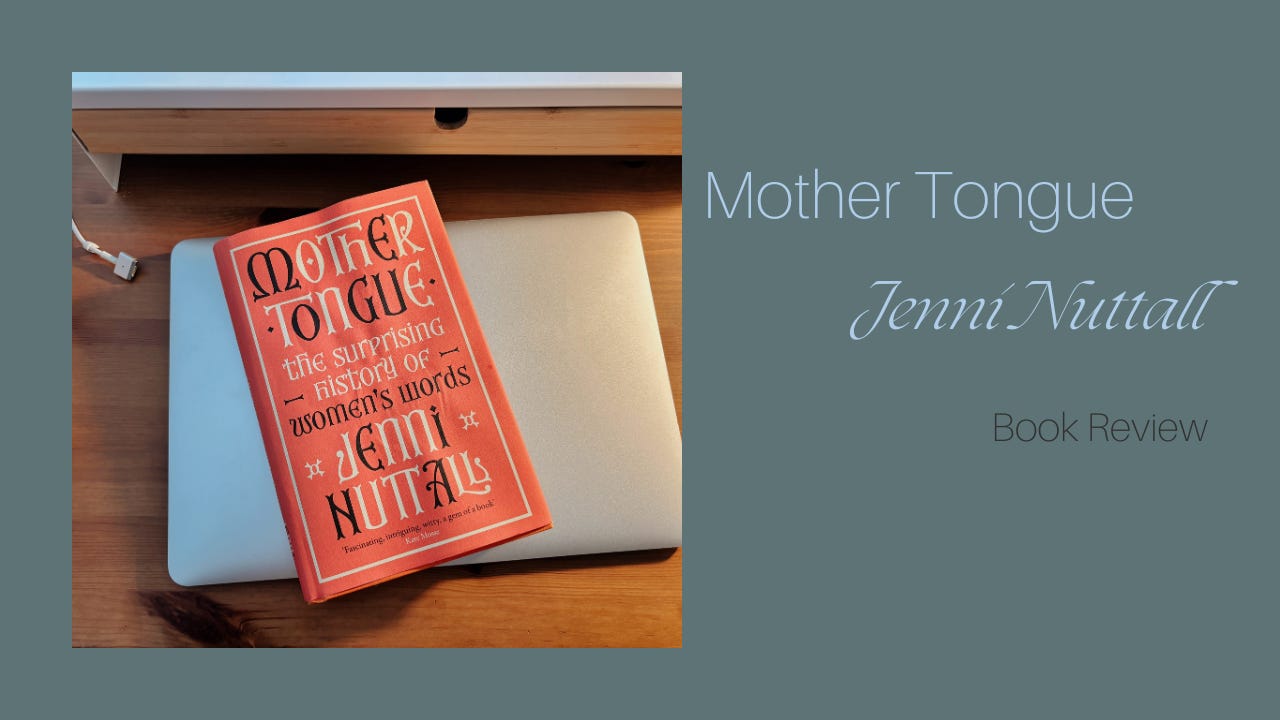Womanhood and the female experience
Review of 'Mother Tongue' by Jenni Nuttall (2023)
This post looks at a book that I recently finished, a feminist history of England from the medieval age to the present through the words used to describe women. It gives an overview of the book’s basic premise before turning to a critique: what the book does well and (in my opinion) not so well.
I hope you enjoy it - and I do hope you end up reading the book.
What is the premise of the book?
Mother Tongue is a history of the words used about women since the medieval age in England. It is not a history of the words used by women, as I thought when I bought it.1
It tracks the development of words related to womanhood and female experiences, covering themes such as anatomy, menstruation, motherhood, work, life stages, and male violence.
I found it very interesting to discover the origins of many of the words we use today, which are often far removed from their etymological origins. The term ‘matrix’, for example, reminds me more of A-Level Maths than the womb.
‘First in Latin and then in English, matrix describes a thing which produces something else, especially a means to reproduce an item more than once.’ (p.100).
From this definition of matrix, it’s easy to see how it related to the process of pregnancy and birth - but it’s definitely not a word I’d use today to describe my little one’s first home, the place Nuttall describes as ‘the womb’s crimson nightclub, dimly lit, its heartbeat-bass thumping’ (p.100).
What does it do well?
This is a deep dive into a whole raft of words used to describe womanhood; countless examples are given across the book’s 292 pages. Despite moving quickly from word to word, Nuttall manages to sustain an engaging flow: the reader feels that they are taken on a journey rather than flitting from one place to another. She moves between words artfully, drawing out their historic roots and the usages that shaped them over time.
Nuttall is unashamed in her feminist approach to the history of women’s words and this is clear from the outset. She presents the sexism inherent in some historic male discussions of the female body, intimacy, sexuality, and reproduction. This is, I think, only to be expected in a writing culture that was almost exclusively made up of men, who often had little critical engagement with women about their lived experiences.2 Chapter 8, ‘Fors’, explores words related to ‘male violence’, whilst Chapter 9, ‘Custom and Tyranny’, is subtitled ‘Finding feminism’s vocabulary’.
It is in her chapter on the words used for ages and stages, ‘Ghyrles and Hags’, that Nuttall explains how ‘most texts were written by men who defaulted to their own life experiences’ (p.190). She doesn’t ascribe good or bad to this, simply acknowledges it.
This got me thinking about the impact this male perspective has had on our history and language. How different, for example, would our records of Anglo-Saxon England (my specialism) be if they were written by women? What details might they have chosen to record that the men didn’t think to preserve? What texture might we have had that is now lost?
What does it not do so well?
This book should come with a health warning: it is very explicit in its chapters on female anatomy (Chapter 1: ‘Cors’) and sex (Chapter 3: ‘Lust). Nuttall does not shy away from even the most taboo of terms, exploring the full spectrum of acceptability. The placement of these chapters at the start means that the book’s content came as a bit of a shock to me and I’ll admit that I thought about putting the book aside several times. It is helpful to note, however, that this explicit discussion is limited only to a couple of chapters, which can easily be skipped if this is not your thing. I’m glad that I finished the book, but found the later chapters to be slightly easier reading.
I was also sad when I realised that the book focused on words used about women rather than by women. I had been looking forward to reading the whisps and slips of lives caught in incidental references, preserved in texts created for other purposes. Nuttall’s focus may well reflect the sources available to her: I know, for example, that very few female perspectives remain from my time period. I am also critiquing something that the book didn’t set out to do:
‘The informal words such gossiping might have used have largely vanished without trace - I can’t find you much in the written records.’ (pp.133-4).
The book therefore adopts a very top-down approach: it is a history of the words used by those who could write them, often men. Her discussion of medieval medical science (p.248) made me wonder how much of this perspective was shared by ‘ordinary’ men and women, on the ground, in their everyday parlance. Did they think in the same ways that these writers did? Was gender, for example, a consideration of theirs or only discussed by writers?
What’s a standout quote or section?
There are so many. I’ll leave you with a few quotes that I particularly enjoyed.
‘My favourite English pregnancy verb is, admittedly, quite a rare one. Dictionaries record it in this sense only in a book written by a London citizen called Henry Lovelich, a merchant who traded in skins, hides and furs. At the request of a fellow skinner, Lovelich translated two French romances about Arthur and his knights of the Round Table. Describing King Arthur’s mother Igraine, another victim of sex by deception … Lovelich says she ‘barnesched wondir faste’, she grew with child amazingly quickly. Barn means ‘child’, so Igraine is not just blooming but literally barnishing, child-making’. (p.111).
I quite like the sound of ‘child-making’ as a description of pregnancy.
‘In 1798, in her anonymously published Appeal to the Men of Britain, [Mary] Hays said with uncompromising candour that the gendered socialisation which shapes women’s minds and controls their behaviour was ‘perhaps the most completely absurd’ system which human nature had dreamt up in a moment of madness, ‘if indeed a bundle of contradictions and absurdities may be called a system’. Such glorious snark.’ (pp.256-7).
Such glorious snark indeed.
Who should read this book?
‘This is a book for anyone who loves language - and for feminists who want to look to the past in order to move forwards.’
From the blurb - this is who the book wants to be ready by
Anyone interested in…
Etymology (although, as Nuttall highlights several times, the origins of a word, its roots, don’t necessarily define its meaning today; these words have been warped and changed over time, although it’s very interesting to read about how individuals used these words in history, the same or similar words that we use today often for different reasons).
Feminism. Nuttall is not a man-hatey feminist (as many on other social media platforms can sometimes sound…), but she does highlight how words have been used to create and sustain female oppression over time.
Who should not read this book…
Anyone who…
Would prefer to stay away from the discussion of intimacy and coarse words used to describe the body and female body parts.
Finds it triggering to read discussions of rape and domestic violence. These, unfortunately, have been a consistent feature of female experience throughout history, using words shaped by the a complex web of social factors. But, if they are difficult topics for you personally, I would not advise reading this book.
Let me know if you decide to read Mother Tongue, and comment to share below what you’ve been reading recently.
Are you new here? Check out my welcome post below to find out more about me and what you can expect here on Telling Their Tales.
Telling Their Tales - What's it all about?
Hi there, I’m Holly. Welcome! I’m currently a full-time stay-at-home-mum, having welcomed our little one in May 2023, and I pursue my love for reading and writing history in the edges of motherhood (read: during nap times). Motherhood has changed me entirely in more ways than I have words to describe here, but one of the best is that I’ve been able to sp…
This is my fault entirely. The blurb describes the book as follows: ‘From the dawn of Old English to the present, Dr Jenni Nuttall guides readers through the evolution of the words we have used to describe bodies, menstruation, sexuality, the consequences of male violence, childbirth, paid and unpaid work, and gender.’
Many medieval texts, for example, were written by monks, deliberately kept away from women in their pursuit of a holy life.














So interesting to read about! I recently learned that the English word 'taboo' comes from an ancient Polynesian word for menstruation, 'tabua' - fascinating and sad
- S
So good, this book sounds fascinating! Though I completely get where you are coming from, in an ideal world the words would be from a female perspective xx